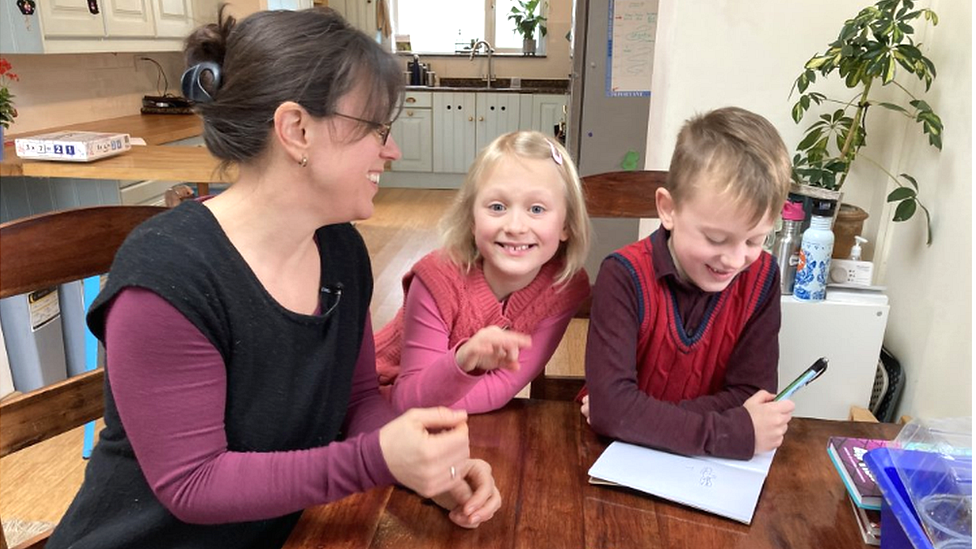High number of pupils regularly missing school

Ofsted says Covid lockdowns damaged the "social contract" that children must go to school
- Published
Almost a quarter of children in Bristol are persistently absent from school, according to Ofsted.
Figures published on Thursday revealed 23.5% of students are missing at least 10% of school hours, which experts believe is a legacy of the Covid lockdowns.
James McNeillie, Ofsted's regional director for the South West, said a rise in children experiencing poor mental health was also a factor behind the large number of students regularly missing school.
A spokesperson for Bristol City Council said: "We recognise that improving attendance is a priority for both academic achievement and keeping children safe."
'Social contract'
Bristol has the sixth highest rate of persistent absence in the country.
This year's figure of 23.5% has dropped in comparison to last year's figure which stood at 27.4%.
Nationally the average number of children missing a day every fortnight or more was 19% over the past school year.
Pre-pandemic in 2018/2019, the figure was just 11%.
The figures for Somerset and North Somerset were also above average, at 21% and 20% respectively over the past school year.
Speaking to BBC West, Mr McNeillie warned persistent absence deprives children not just of a good education but of the opportunity to build social skills.
He said lockdowns had damaged the "sense of social contract" that children must go to school every single day they are well enough to do so.

Children who miss school miss out on developing social skills, Ofsted says
"Not being in school means they are not getting access to good quality education," he said.
"The other aspect they are missing out on is that personal development - their ability to socialise, to make friends, to understand how to work with people and build resilience."
Mr McNeillie added that regular absences lead to "an increase in vulnerability" as teachers are unable to keep an eye on children's welfare.
He said multi-partnership working between schools, parents and health and social care professionals was the best way to get children back into school but many local authorities were struggling to meet demand.
Bristol City Council said it was working with trusts and schools to improve the situation and recently held a Bristol Attendance Conference with participation from 130 schools which marked "a significant step forward in tackling this issue".
"Building on this momentum, we will maintain our focus on leveraging data, sharing best practices, and strengthening partnerships.
"Our commitment remains steadfast to supporting high levels of attendance across all schools and we are ensuring timely assistance and meaningful engagement with families to address their needs."
Severe shortage
The rise in the number of children with a diagnosis of special educational needs and disability (SEND) was also creating a problem for schools which often do not have the resources to support them.
Elsewhere in the region, it emerged that parts of Somerset have a severe shortage of early years childcare places such as nurseries and childminders.
It had an average of just 20.2 full-time places in regulated settings per 100 eligible children compared to 30 and 31 places in Gloucestershire and Wiltshire.
The fact that Somerset is so rural makes it hard for providers to set up in the right places, Mr McNeillie said.
It also makes it hard for them to recruit and retrain high quality staff.

Somerset has a severe shortage of early years childcare places
"We know the best start in life for children is about being safe, being happy and setting that really positive experience of learning and development," he said.
Heather Shearer, lead member of Somerset Council for children, families and education, said the council was working hard to try to create childcare places.
"We want to try and target our efforts in areas where we know there is a need," she said.
The council is helping primary schools open nursery classes under the government's school-based nursery scheme and is offering capital grants to private providers.
"It may be a cliche but children are our future," Ms Shearer said.
Get in touch
Tell us which stories we should cover in Bristol
Follow BBC Bristol on Facebook, external, X, external and Instagram, external. Send your story ideas to us on email or via WhatsApp on 0800 313 4630.
Related topics
- Published14 November 2024

- Published28 February 2024

- Published23 November 2023
